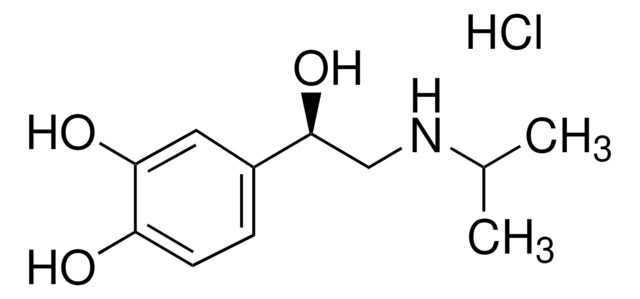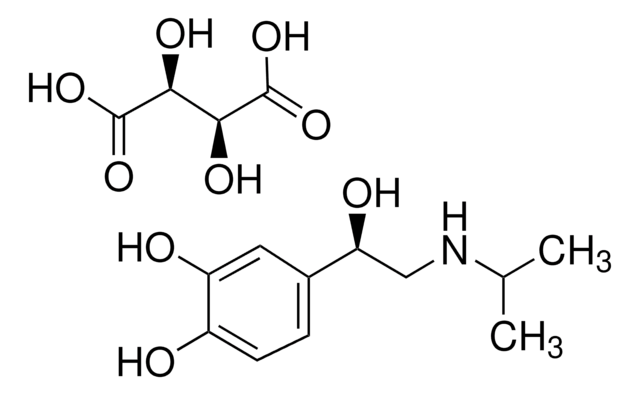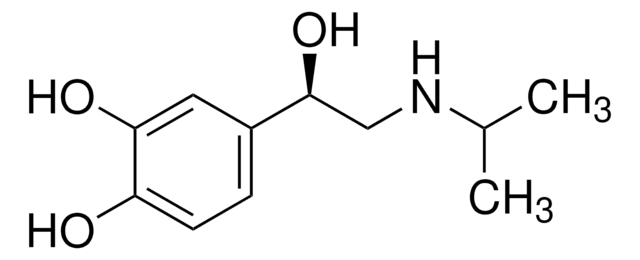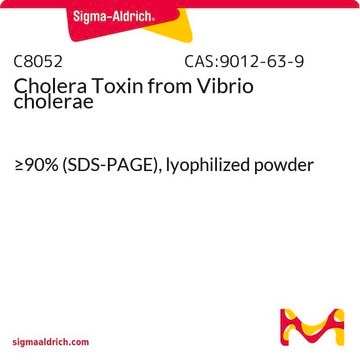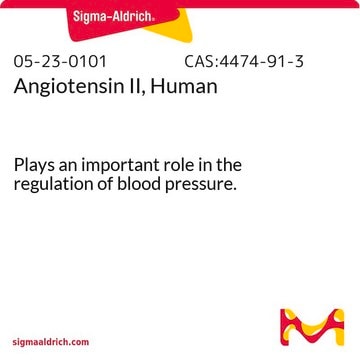420355
Isoprenaline hydrochloride
≥99% (TLC), solid, β-adrenoceptor agonist, Calbiochem
Synonym(s):
Isoproterenol, Hydrochloride
About This Item
Recommended Products
Product Name
Isoproterenol, Hydrochloride, Phenethylamine derivative.
Quality Level
Assay
≥99% (TLC)
form
solid
manufacturer/tradename
Calbiochem®
storage condition
OK to freeze
protect from light
color
white to off-white
white
solubility
ethanol: soluble
water: soluble
shipped in
ambient
storage temp.
10-30°C
SMILES string
[Cl-].N(C(C)C)CC(O)c1cc(c(cc1)O)O.[H+]
InChI
1S/C11H17NO3.ClH/c1-7(2)12-6-11(15)8-3-4-9(13)10(14)5-8;/h3-5,7,11-15H,6H2,1-2H3;1H
InChI key
IROWCYIEJAOFOW-UHFFFAOYSA-N
General description
Biochem/physiol Actions
β-adrenergic agonist
Warning
Reconstitution
Other Notes
Carmena, M.J., et al. 1997. Prostate 33, 46.
Takemura, H., et al. 1995. J. Pharmacol. Exp. Ther. 274, 584.
Kishimoto, I., et al. 1994. J. Biol. Chem.269, 28300.
Macaulay, S.L., et al. 1994. Mol. Cell Biochem.141, 27.
Yashiro, K., et al. 1994. J. Biochem.115, 1040.
Ladenheim, R.G., et al. 1993. J. Neurochem.60, 260.
von Zastrow, M., et al. 1993. J. Biol. Chem.268, 763.
Mokhtari, A., et al. 1985. J. Cyclic Nucleotide Protein Phosphorylation Res.10, 213.
Legal Information
Storage Class Code
11 - Combustible Solids
WGK
WGK 2
Flash Point(F)
Not applicable
Flash Point(C)
Not applicable
Certificates of Analysis (COA)
Search for Certificates of Analysis (COA) by entering the products Lot/Batch Number. Lot and Batch Numbers can be found on a product’s label following the words ‘Lot’ or ‘Batch’.
Already Own This Product?
Find documentation for the products that you have recently purchased in the Document Library.
Customers Also Viewed
Articles
Gain a deeper understanding of the various types of receptor agonists and antagonists, including full, partial, and inverse agonists and competitive/reversible and non-competitive/irreversible antagonists.
Gain a deeper understanding of the various types of receptor agonists and antagonists, including full, partial, and inverse agonists and competitive/reversible and non-competitive/irreversible antagonists.
Gain a deeper understanding of the various types of receptor agonists and antagonists, including full, partial, and inverse agonists and competitive/reversible and non-competitive/irreversible antagonists.
Gain a deeper understanding of the various types of receptor agonists and antagonists, including full, partial, and inverse agonists and competitive/reversible and non-competitive/irreversible antagonists.
Our team of scientists has experience in all areas of research including Life Science, Material Science, Chemical Synthesis, Chromatography, Analytical and many others.
Contact Technical Service